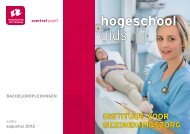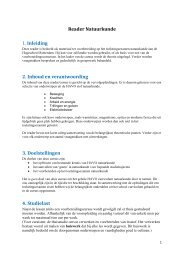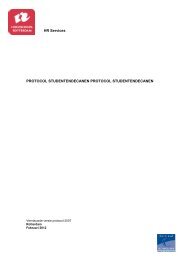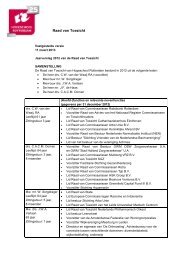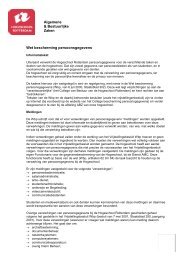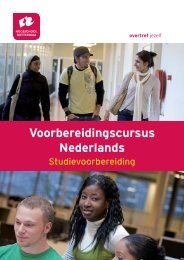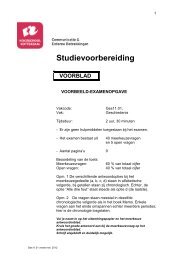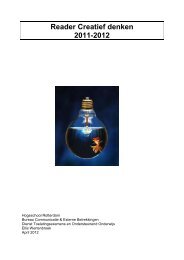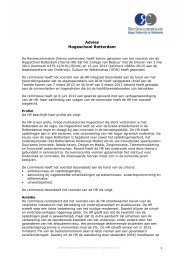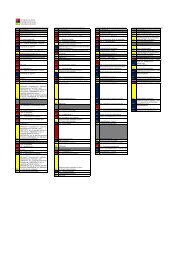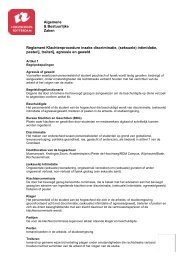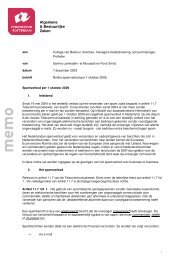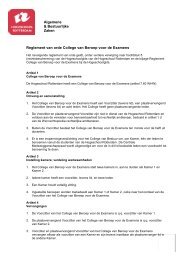Rotterdam University of Applied Sciences - Hogeschool Rotterdam
Rotterdam University of Applied Sciences - Hogeschool Rotterdam
Rotterdam University of Applied Sciences - Hogeschool Rotterdam
You also want an ePaper? Increase the reach of your titles
YUMPU automatically turns print PDFs into web optimized ePapers that Google loves.
<strong>Rotterdam</strong> <strong>University</strong> <strong>of</strong> <strong>Applied</strong> <strong>Sciences</strong><br />
And the Dutch education system<br />
<strong>Rotterdam</strong> <strong>University</strong> <strong>of</strong> <strong>Applied</strong> <strong>Sciences</strong><br />
<strong>Rotterdam</strong> <strong>University</strong> <strong>of</strong> <strong>Applied</strong> <strong>Sciences</strong> (<strong>Hogeschool</strong> <strong>Rotterdam</strong>) is one <strong>of</strong> the major Universities <strong>of</strong><br />
<strong>Applied</strong> <strong>Sciences</strong> in the Netherlands: over 28,000 young people study for a bachelor’s, master’s or<br />
associate degree.<br />
<strong>Rotterdam</strong> <strong>University</strong> <strong>of</strong> <strong>Applied</strong> <strong>Sciences</strong> is a multi-sectoral institution specializing in the sectors:<br />
Arts, Media & Design, Education (teacher-training colleges), Behaviour and Society, Health Care,<br />
Economics and Business Administration, and Engineering and Technology. Nearly all pr<strong>of</strong>essional<br />
fields are represented in the <strong>University</strong>’s programmes.<br />
<strong>Rotterdam</strong> <strong>University</strong> <strong>of</strong> <strong>Applied</strong> <strong>Sciences</strong> will ensure that its study programmes will always be based<br />
on highly topical concepts and perceptions. Students are taught how to deal with real-life issues which<br />
are relevant to their study programmes. The best way to do so is to have the students tackle real-life<br />
issues taken from pr<strong>of</strong>essional practice. Doing so will add to the students’ personal development<br />
causing the students to make their own, personal decisions.<br />
<strong>Rotterdam</strong> <strong>University</strong> <strong>of</strong> <strong>Applied</strong> <strong>Sciences</strong> attempts to support this as much as possible by <strong>of</strong>fering<br />
tailor-made programmes. <strong>Rotterdam</strong> <strong>University</strong> <strong>of</strong> <strong>Applied</strong> <strong>Sciences</strong> prepares students for a<br />
pr<strong>of</strong>ession in a multicultural society, a global economy and on an internationally oriented labour<br />
market. The study programmes combine a sound foundation <strong>of</strong> knowledge and skills with an intensive<br />
orientation on practice. At <strong>Rotterdam</strong> <strong>University</strong> <strong>of</strong> <strong>Applied</strong> <strong>Sciences</strong>, a final thesis is specifically<br />
tested for the extent <strong>of</strong> innovation to the student’s future pr<strong>of</strong>essional area. This element is highly<br />
valued. Taking a study programme at <strong>Rotterdam</strong> <strong>University</strong> <strong>of</strong> <strong>Applied</strong> <strong>Sciences</strong> results in highly<br />
trained pr<strong>of</strong>essionals well prepared for further careers.<br />
Accreditation and Quality Assurance<br />
<strong>Rotterdam</strong> <strong>University</strong> <strong>of</strong> <strong>Applied</strong> <strong>Sciences</strong> has been conferred the status <strong>of</strong> a recognized and funded<br />
institution and all programmes have been registered in the Central Register <strong>of</strong> Higher Education<br />
Study Programmes (CROHO).<br />
The quality <strong>of</strong> the certificates awarded by <strong>Rotterdam</strong> <strong>University</strong> <strong>of</strong> <strong>Applied</strong> <strong>Sciences</strong> is guaranteed<br />
through participation in the national system <strong>of</strong> legal regulation and quality assurance, which is closely<br />
monitored by The Dutch-Flemish Accreditation Organization (NVAO). The level <strong>of</strong> programmes at<br />
<strong>Rotterdam</strong> <strong>University</strong> <strong>of</strong> <strong>Applied</strong> <strong>Sciences</strong> meets the ‘Dublin Descriptors’. In addition, the quality <strong>of</strong> the<br />
separate programmes is guaranteed through an internal system <strong>of</strong> quality assurance, both at School<br />
and individual study programme level. This system concurs with the NVAO’s accreditation criteria and<br />
with the <strong>University</strong>’s own criteria for quality assurance.<br />
The Executive Board monitors the quality <strong>of</strong> the Schools and the programmes <strong>of</strong>fered by arranging<br />
regular staff meetings on Planning and Control.<br />
Outside in, Inside out<br />
<strong>Rotterdam</strong> <strong>University</strong> <strong>of</strong> <strong>Applied</strong> <strong>Sciences</strong>, being the centre <strong>of</strong> expertise that it is, is inextricably linked<br />
with the City <strong>of</strong> <strong>Rotterdam</strong> and closely involved in the economic and social developments <strong>of</strong> the<br />
<strong>Rotterdam</strong> region. All study programmes at <strong>Rotterdam</strong> <strong>University</strong> <strong>of</strong> <strong>Applied</strong> <strong>Sciences</strong> clearly address<br />
issues that are relevant to the region. The students <strong>of</strong> <strong>Rotterdam</strong> <strong>University</strong> <strong>of</strong> <strong>Applied</strong> <strong>Sciences</strong> are<br />
<strong>of</strong>ten asked to participate in numerous projects requiring a multidisciplinary approach, at the<br />
instigation <strong>of</strong> companies and social organizations. At the same time, <strong>Rotterdam</strong> <strong>University</strong> <strong>of</strong> <strong>Applied</strong><br />
<strong>Sciences</strong> uses the hands-on experience <strong>of</strong> its partners to enrich its theoretical instruction. This is the<br />
essence <strong>of</strong> the <strong>University</strong>’s view on education: outside in – inside out. Gaining knowledge from<br />
pr<strong>of</strong>essional practice and applying knowledge in practice. A win-win cycle <strong>of</strong> knowledge, beneficial to<br />
all parties involved.<br />
The <strong>Rotterdam</strong> Educational Model<br />
All programmes at <strong>Rotterdam</strong> <strong>University</strong> <strong>of</strong> <strong>Applied</strong> <strong>Sciences</strong> are based on a singular view on<br />
education: the <strong>Rotterdam</strong> Educational Model. Its basic principle is that students acquire competencies<br />
to be able to adequately handle issues arising in their future pr<strong>of</strong>essional practice. Knowledge and<br />
skills are always related to the pr<strong>of</strong>essional area <strong>of</strong> practice <strong>of</strong> a starting pr<strong>of</strong>essional.<br />
All programmes include three learning tracks:
Knowledge-driven track: subjects aimed at acquiring knowledge, theoretical concepts and skills,<br />
including lectures, seminars, training and practical’s.<br />
Practice-driven track: subjects in which the search for practical solutions to real-life problems is<br />
derived directly from pr<strong>of</strong>essional practice, such as practical training, on-the-job training and<br />
graduation projects.<br />
Student-driven track: the focus <strong>of</strong> this part <strong>of</strong> the educational model is on the individual student.<br />
Based on their learning objectives and the competencies they aim to acquire, the students choose<br />
their own subjects such as electives, minor programmes and honour programmes.<br />
As study progresses, students can increasingly steer their own course and better prepare themselves<br />
for their own future pr<strong>of</strong>essional practice. All students are <strong>of</strong>fered study counselling throughout their<br />
entire study.<br />
Honours degree<br />
Students, who would like to qualify for an honours degree, can participate in an honours degree<br />
programme, provided they meet the admission requirements.<br />
In an honours degree programme students are required to use a multidisciplinary approach to realize<br />
innovative practical solutions for socially relevant issues. Students who have successfully completed<br />
the programme, will be awarded an honours degree.<br />
The Dutch education system<br />
The Netherlands has a binary system <strong>of</strong> higher education, i.e. there are two types <strong>of</strong> programmes:<br />
research-oriented education (wetenschappelijk onderwijs, WO), traditionally <strong>of</strong>fered by research<br />
universities, and higher pr<strong>of</strong>essional education (hoger beroepsonderwijs, HBO), traditionally <strong>of</strong>fered<br />
by hogescholen, or Universities <strong>of</strong> <strong>Applied</strong> <strong>Sciences</strong>. In this description, the Dutch abbreviations WO<br />
and HBO will be used.<br />
Primary and secondary education<br />
Children are allowed to begin school at the age <strong>of</strong> four, but are not legally required to do so until the<br />
age <strong>of</strong> five. Primary education lasts eight years (<strong>of</strong> which seven are compulsory), in the last year <strong>of</strong><br />
which pupils are advised as to the type <strong>of</strong> secondary education they should pursue.<br />
Secondary education, which begins at the age <strong>of</strong> 12 and is compulsory until the age <strong>of</strong> 16, is <strong>of</strong>fered<br />
at several levels. VMBO programmes (four years) combine general and vocational education, after<br />
which pupils can continue in secondary vocational education (MBO), which lasts one to four years.<br />
The two programmes <strong>of</strong> general education granting admission to higher education are HAVO (five<br />
years) and VWO (six years). Pupils are enrolled according to their ability, and although VWO is more<br />
rigorous, both HAVO and VWO can be characterized as selective types <strong>of</strong> secondary education. The<br />
VWO curriculum prepares pupils for university and only the VWO diploma grants access to WO. The<br />
HAVO diploma is the minimum requirement for access to HBO. The last two years <strong>of</strong> HAVO and the<br />
last three years <strong>of</strong> VWO are referred to as the tweede fase (literally, second phase), or upper<br />
secondary education. During these years, pupils focus on one <strong>of</strong> four subject clusters (pr<strong>of</strong>ielen),<br />
each <strong>of</strong> which emphasizes a certain field <strong>of</strong> study in addition to general education requirements. Each<br />
cluster is designed to prepare pupils for study programmes at the tertiary level. A<br />
pupil enrolled in VWO or HAVO can choose from the following subject clusters:<br />
1) <strong>Sciences</strong> and Technology (Natuur en Techniek)<br />
2) <strong>Sciences</strong> and Health (Natuur en Gezondheid)<br />
3) Economics and Society (Economie en Maatschappij)<br />
4) Culture and Society (Cultuur en Maatschappij).<br />
Secondary vocational education (MBO)<br />
Secondary vocational education (MBO, secundair beroepsonderwijs) is <strong>of</strong>fered in the areas <strong>of</strong><br />
economics, technology, health, personal care, social welfare and agriculture. MBO programmes vary<br />
in length (one to four years) as well as in level (1 to 4). Graduates <strong>of</strong> VMBO programmes are eligible<br />
for admission to MBO, and completion <strong>of</strong> MBO programmes at level 4 qualifies pupils for access to<br />
HBO.<br />
Higher education
Higher education in the Netherlands is <strong>of</strong>fered at two types 1 <strong>of</strong> institutions: research universities<br />
(universiteiten) and Universities <strong>of</strong> <strong>Applied</strong> <strong>Sciences</strong> (hogescholen). Research universities include<br />
general universities, universities specializing in engineering and agriculture, and the Open <strong>University</strong>.<br />
Research universities are primarily responsible for <strong>of</strong>fering research-oriented programmes<br />
(Wetenschappelijk Onderwijs, WO). Dutch research universities provide education and conduct<br />
research in a wide range <strong>of</strong> disciplines: language and culture, behaviour and society, economics, law,<br />
medical and health sciences, natural sciences, engineering, and agriculture. Universities <strong>of</strong> <strong>Applied</strong><br />
<strong>Sciences</strong> include general institutions as well as institutions specializing in one <strong>of</strong> the seven HBO<br />
sectors: agriculture, engineering and technology, economics and business administration, health care,<br />
fine and performing arts, education (teacher training), and social welfare. Universities <strong>of</strong> <strong>Applied</strong><br />
<strong>Sciences</strong> are primarily responsible for <strong>of</strong>fering programmes <strong>of</strong> higher pr<strong>of</strong>essional education (Hoger<br />
Beroepsonderwijs, HBO), preparing students for particular pr<strong>of</strong>essions. These tend to be more<br />
practically oriented than programmes <strong>of</strong>fered by research universities. In addition to lectures,<br />
seminars, projects and independent study, students are required to complete an internship or<br />
practical training (stage) which normally takes up part <strong>of</strong> the third year <strong>of</strong> study, as well as a final<br />
project or a major paper in the fourth year.<br />
Since September 2002, the higher education system in the Netherlands has been organized around a<br />
three-cycle degree system consisting <strong>of</strong> bachelor, master and PhD degrees. At the same time, the<br />
European Credit Transfer System (ECTS) was adopted as a way <strong>of</strong> quantifying periods <strong>of</strong> study. The<br />
higher education system continues to be a binary system, however, with a distinction between<br />
research-oriented education and higher pr<strong>of</strong>essional education. The focus <strong>of</strong> degree programmes<br />
determines both the number <strong>of</strong> credits required to complete the programme and the degree awarded.<br />
A WO bachelor’s programme requires the completion <strong>of</strong> 180 credits (3 years) and graduates obtain<br />
the degree <strong>of</strong> Bachelor <strong>of</strong> Arts or Bachelor <strong>of</strong> <strong>Sciences</strong> (BA/BSc), depending on the discipline. An<br />
HBO bachelor’s programme requires the completion <strong>of</strong> 240 credits (4 years) and graduates obtain a<br />
degree indicating the field <strong>of</strong> study (for example, Bachelor <strong>of</strong> Engineering, B. Eng., or Bachelor <strong>of</strong><br />
Nursing, B. Nursing). The (Dutch) title used before 2002, appropriate to the<br />
discipline in question (bc., ing.) may still be used. Institutions <strong>of</strong>fer WO master’s programmes requiring<br />
in most cases the completion <strong>of</strong> 60 or 120 credits (1 or 2 years). Some programmes require 90 credits<br />
(1.5 years) or more than 120 credits. In engineering, agriculture, and mathematics and the natural<br />
sciences, 120 credits are always required. Graduates obtain the degree <strong>of</strong> Master <strong>of</strong> Arts or Master <strong>of</strong><br />
<strong>Sciences</strong> (MA/MSc). The (Dutch) title used before 2002, appropriate to the discipline in question (drs.,<br />
mr., ir.) may still be used. An HBO master’s programme requires the completion <strong>of</strong> 60 to 120 credits<br />
and graduates obtain a degree indicating the field <strong>of</strong> study (for example, Master <strong>of</strong> Social Work,<br />
MSW).<br />
The third cycle <strong>of</strong> higher education, leading to a doctor’s degree, is <strong>of</strong>fered only by research<br />
universities. All research universities in the Netherlands are entitled to award the country’s highest<br />
academic degree, the doctoraat, which entitles a person to use the title <strong>of</strong> doctor, abbreviated to dr.<br />
The process by which a doctorate is obtained is referred to as the promotie. The doctorate is primarily<br />
a research degree, for which a dissertation based on original research must be written and publicly<br />
defended. The minimum amount <strong>of</strong> time required to complete a doctorate is four years.<br />
Requirements for Admission to Higher Education<br />
For access to WO bachelor’s programmes, students are required to have a VWO diploma or to have<br />
completed the first year (60 credits) <strong>of</strong> an HBO programme. The minimum access requirement for<br />
HBO is either a HAVO diploma or a level-4 MBO diploma. The VWO diploma also grants access to<br />
HBO. For access to both types <strong>of</strong> higher education, pupils are required to have completed at least<br />
one <strong>of</strong> the subject clusters fulfilling the requirements for the higher education programme in question.<br />
A quota, or numerus fixus, applies for access to certain programmes, primarily in the health sector,<br />
and places are allocated using a weighted lottery. Potential students older than 21 years <strong>of</strong> age who<br />
do not possess one <strong>of</strong> the qualifications mentioned above can qualify for access to higher education<br />
on the basis <strong>of</strong> an entrance examination and assessment. The only access requirement for the Open<br />
<strong>University</strong> is that applicants be at least 18 years <strong>of</strong> age.<br />
For access to all master’s programmes, a bachelor’s degree in one or more specified disciplines is<br />
required, in some cases in combination with other requirements. Graduates with an HBO bachelor’s<br />
degree may have to complete additional requirements for access to a WO master’s degree<br />
programme. Credit System and Grading Workload is measured in credits. Since 2002, a student’s<br />
workload is measured in ects credits. According to Dutch law, one credit represents 28 hours <strong>of</strong> work<br />
and 60 credits represent one year <strong>of</strong> full-time study. The grading system has been the same for<br />
several decades: the scale is from 1 (very poor) to 10 (outstanding pass with distinction).The lowest
passing grade is 5.5; 9s are seldom given and 10s are extremely rare; grades 1-3 are hardly ever<br />
used.<br />
Accreditation and Quality Assurance<br />
A guaranteed standard <strong>of</strong> higher education is maintained through a national system <strong>of</strong> legal regulation<br />
and quality assurance. The Ministry <strong>of</strong> Education, Culture and <strong>Sciences</strong> is responsible for legislation<br />
pertaining to education. As <strong>of</strong> 2002, responsibility for accreditation lies with the NVAO. According<br />
to the section <strong>of</strong> the Dutch Higher Education and Research Act dealing with the accreditation <strong>of</strong><br />
higher education, all degree programmes <strong>of</strong>fered by research universities and universities <strong>of</strong><br />
<strong>Applied</strong> <strong>Sciences</strong> will be evaluated according to established criteria, and programmes meeting those<br />
criteria will be accredited, i.e. recognized for a period <strong>of</strong> six years. Only accredited programmes<br />
will be eligible for government funding, and students will receive financial support and graduate with a<br />
recognized degree only when enrolled in, or after having completed, an accredited degree<br />
programme. Accredited programmes will be listed in the Central Register <strong>of</strong> Higher Education Study<br />
Programmes (CROHO) and the information is available to the public. All programmes registered in<br />
CROHO that have adhered to the quality assurance regulations, are considered to be recognized by<br />
law. In addition to accreditation <strong>of</strong> degree programmes, the Netherlands has a system by which the<br />
Ministry <strong>of</strong> Education, Culture and <strong>Sciences</strong> recognizes higher education institutions by conferring on<br />
them the status <strong>of</strong> either funded (bekostigd) or approved (aangewezen). Funded indicates that the<br />
institution is financed by the government. Approved indicates that the institution does not receive any<br />
funds from the government and has to rely on its own resources. Regardless <strong>of</strong> whether a degree<br />
programme is <strong>of</strong>fered by a ‘funded’ or an ‘approved’ institution, it must be accredited and registered in<br />
CROHO to be considered recognized.<br />
According to legislation regarding accreditation, institutions are required to state on degree certificates<br />
the date on which the degree programme in question was granted accreditation. At this stage, only a<br />
few programmes have actually been accredited. Because accreditation is an ongoing process, it is<br />
important that people who review Dutch degrees make sure that a programme had been accredited at<br />
the time the degree was awarded. Once accredited, the validity <strong>of</strong> the accreditation <strong>of</strong> that particular<br />
degree is <strong>of</strong> course permanent.<br />
The higher education system also includes a third branch, with a relatively small number <strong>of</strong><br />
students, known as internationaal onderwijs (IO), or international education. IO <strong>of</strong>fers advanced<br />
training courses originally designed for people from developing countries whose jobs require<br />
highly specialized knowledge. Problem-oriented courses and programmes <strong>of</strong> various types,<br />
including master’s degree programmes, are <strong>of</strong>fered in a wide range <strong>of</strong> specific fields. The emphasis<br />
can be either on research or on the practical application <strong>of</strong> knowledge. Courses are given in English<br />
and last from a few weeks to two years. With one exception (the Institute <strong>of</strong> Social Studies in<br />
The Hague), the institutes <strong>of</strong> international education do not <strong>of</strong>fer PhD programmes themselves<br />
but have concluded agreements with Dutch universities which enable their students to pursue<br />
doctorates. Admission requirements vary according to the course in question, but in most cases<br />
a bachelor’s degree or its equivalent is required for admission to a master’s degree programme,<br />
and a master’s degree for admission to a PhD programme. Work experience is an additional<br />
requirement.<br />
International education is subsidized by the government, which finances the institutes<br />
and provides scholarships for students.<br />
<strong>Hogeschool</strong> <strong>Rotterdam</strong> • PO Box 25035 • 3001 HA <strong>Rotterdam</strong> • The Netherlands • T +31(0)10 794 00 00 •<br />
www.hogeschoolrotterdam.nl<br />
versie: ds april 2011



